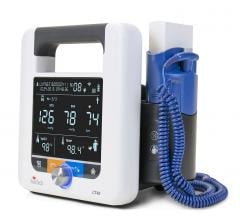
November 8, 2013 — A new way of using blood pressure-lowering medications could prevent more than a fourth of heart attacks and strokes — up to 180,000 per year — while using less medication overall, according to new research from the University of Michigan (U-M) Health System and the VA Ann Arbor Healthcare System.
Individualizing treatment recommendations using patients’ risk of heart disease after considering multiple factors such as age, gender and whether or not the patient smokes is a more effective way to treat patients than current methods, according to the study that appears in the medical journal Circulation.
Current medical guidelines use a one-size-fits-all treatment approach based on target blood pressure values that leads to some patients being on too many medications and others being on too few, authors say.
Researchers found that a person’s blood pressure level is often not the most important factor in determining if a blood pressure medication will prevent these diseases, but common practice is to base treatment strictly on blood pressure levels.
“Drugs that lower blood pressure are among the most effective and commonly used medications in the country, but we believe they can be used dramatically more effectively,” says lead author Jeremy Sussman, M.D., M.Sc., assistant professor of internal medicine, Division of General Medicine, U-M Medical School and research scientist, Center for Clinical Management Research, VA Ann Arbor Healthcare System.
“The purpose of these medications is not actually to avoid high blood pressure itself, but to stop heart attacks, strokes and other cardiovascular diseases. We should guide use of medications by a patient’s risk of these diseases and how much adding a new medication decreases that risk — not solely on their blood pressure level. We found that people who have mildly high blood pressure but high cardiovascular risk receive a lot of benefit from treatment, but those with low overall cardiovascular risk do not.”
Current treatment guidelines emphasize specific blood pressure goals, with the majority of treatment driven specifically towards pushing blood pressure below 140/80 mmHg. However, authors say tailored blood pressure treatment decisions based on a patient’s overall cardiovascular disease risk and the estimated benefits of advancing treatment are a substantially more effective model of care. Authors say new blood pressure guidelines could help patients make informed decisions about their care. For example, if patients knew that medication only slightly reduced their risk of a heart attack or stroke (e.g. from 8 in 100 to 6 in 100 over the next 10 years), they may decide medication is not the right choice for them.
“In addition to resulting in more positive health outcomes for patients, this approach provides the type of information we need to guide individual decisions tailored to the patients’ preferences and priorities,” said senior author Rod Hayward, M.D., professor of Medicine and Public Health, senior investigator, VA Center for Clinical Management Research and senior author. “Our research shows how we can estimate how much taking more blood pressure medicine will reduce an individual’s risk of heart disease and strokes so that they and their doctor can make the best decision for them.”
Both Sussman and Hayward are members of the U-M Institute for Healthcare Policy and Innovation and the Center for Clinical Management Research at Ann Arbor VA. Sandeep Vijan, M.D., M.S., associate professor of internal medicine, U-M Medical School, research scientist, VA Ann Arbor Health Care System and member, IHPI, also authored the study.
For more information: www.ihpi.umich.edu, www.annarbor.hsrd.research.va.gov, circ.ahajournals.org


 February 14, 2022
February 14, 2022 




